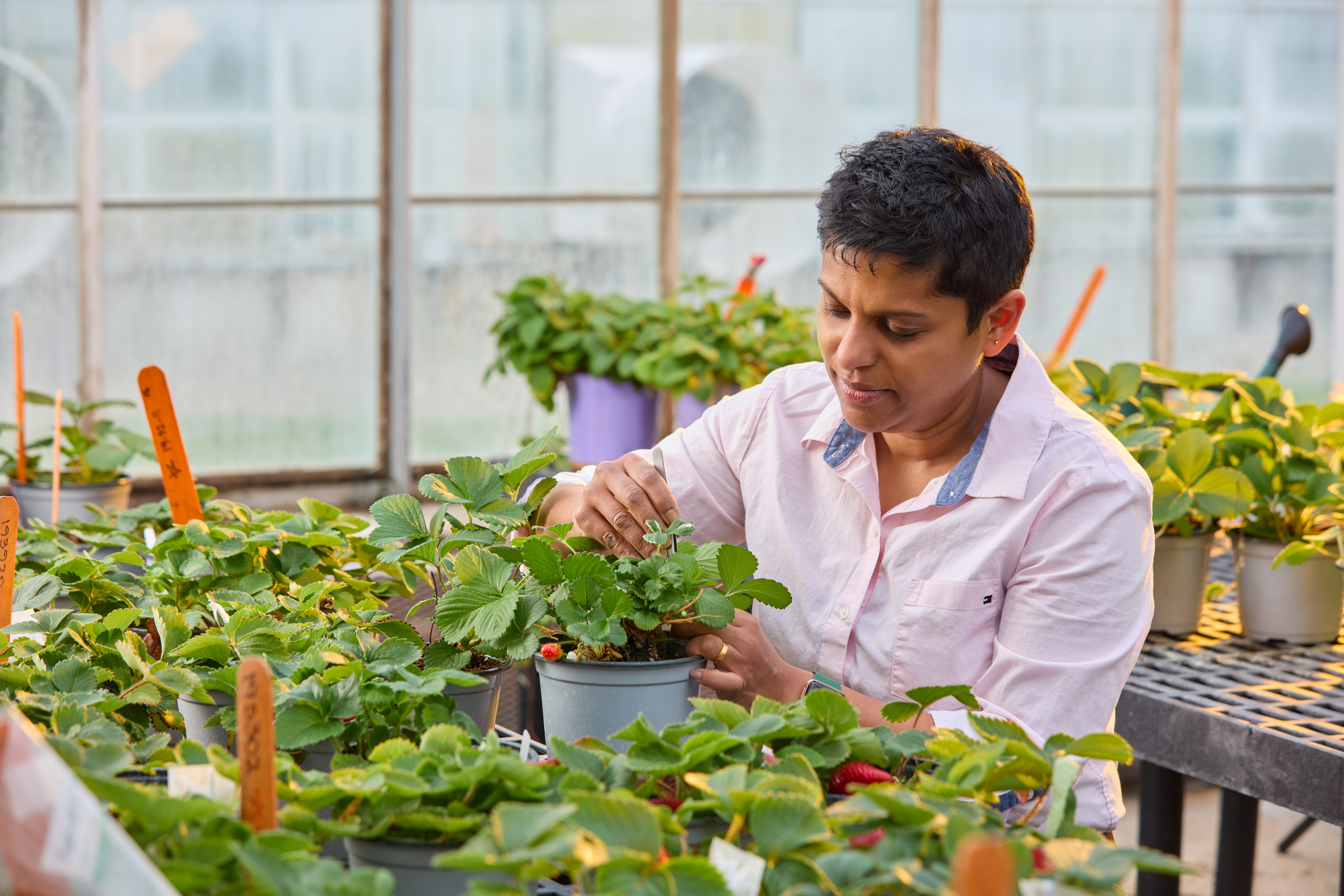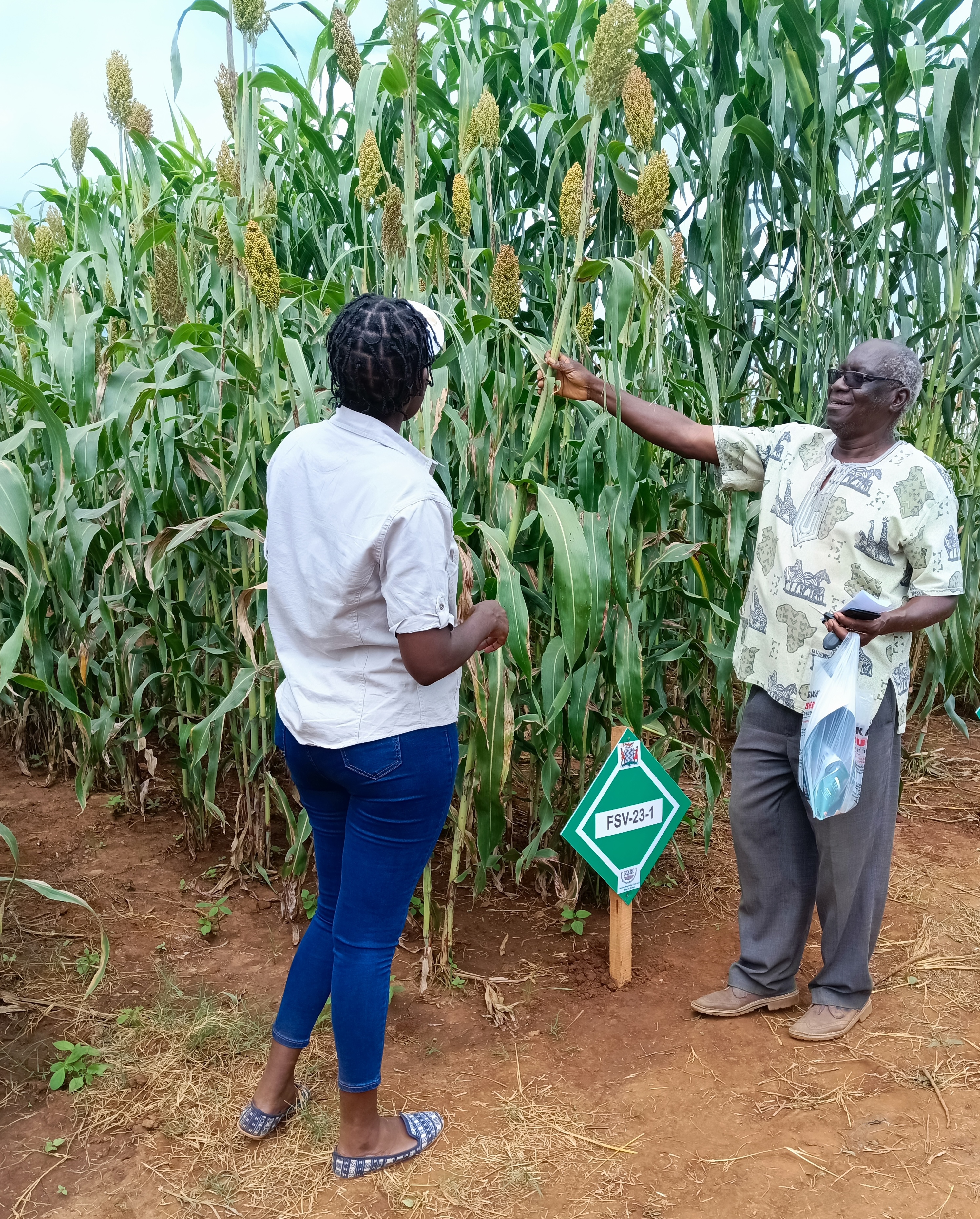Online master’s program growing globally
Asynchronous, online graduate program will allow students to earn a degree in plant breeding from MSU


Cholani Weebadde has a mission.
“I want to train the next generation of plant breeders as hunger fighters,” said Weebadde, associate professor in the Michigan State University Department of Plant, Soil and Microbial Sciences (PSM). “That has been the theme of my research, teaching and outreach since I graduated, but I had not figured out how to best accomplish that until now.”
MSU is now offering an Online Master’s Degree in Plant Breeding program that Weebadde designed to provide students across the United States and around the world access to MSU’s world-renowned faculty and plant science education.
Weebadde, originally from Sri Lanka, came to MSU in 2000 as a graduate student in the College of Agriculture and Natural Resources. After earning her PhD, she worked in international agriculture outreach for over a decade alongside director of CANR International Programs Karim Maredia, while conducting research, teaching and outreach as a faculty member with PSM.
Inspired by the land-grant mission, Weebadde began exploring ways to bring MSU’s world-class plant breeding to a network of plant science students and researchers.
“The coolest thing about MSU, is how MSU Extension brings the problems of Michigan’s farmers to the university, and the university bases its research and education on those needs. MSU was the first place I saw that three-pronged, land-grant mission in action, and I wanted to expand such an effective knowledge-sharing system,” Weebadde said.
 Experts estimate that global food production must double by 2050 to feed a growing population. To meet this goal, plant breeders need to develop climate-resistant crops that can be sustainably grown while building a network of plant breeders ready to respond to emerging challenges.
Experts estimate that global food production must double by 2050 to feed a growing population. To meet this goal, plant breeders need to develop climate-resistant crops that can be sustainably grown while building a network of plant breeders ready to respond to emerging challenges.
Building off the success of the Plant Breeding 2 Fight Hunger Course, a 14-week online course first administered to an international cohort of students during the COVID-19 Pandemic, Weebadde developed an online, asynchronous master’s degree program in plant breeding.
“We want to bring down the cost of education and training for plant breeders,” Weebadde said. “If a student from another state or country wants to obtain this degree from MSU, they do not need to come to East Lansing, they do not need to leave their families, they do not need to leave their jobs, and they can work on crops that are important for their communities at home.”
The program plans its first cohort of students to begin in the Summer of 2025 with applications open to prospective students.
A successful start
At the beginning of the Covid-19 pandemic, Weebadde was unable to host in-person training programs.
She first offered Plant Breeding 2 Fight Hunger as an online course in the summer of 2021. The response was immediate. “In the first year, I had 102 participants from 21 countries, with some seeking online degree programs in plant breeding.”
Asimbuyu Mwangala was a student in the first cohort. Mwangala grew up in Chilanga, a small town in Zambia, with a heavy agricultural background.
“I am the second child of four, raised by an entomologist father and economist mother. Everyone in our community grew as much of their food as they could, even if they had jobs outside of agriculture. Additionally, the country’s largest research station – that I now work for – is based in the neighborhood. So, growing, harvesting and preserving food and being introduced to the latest crop varieties was part of my life growing up,” Mwangala said.
“While I didn’t like being woken up early to go work in the field during the December school holidays nor being scratched with dry husks in the harvest season during the April holidays, I knew the importance of growing your own food and being food secure at a household level,” she said.
Mwangala obtained a specialist degree in agronomy in St. Petersburg, Russia in 2010, and has worked with a sorghum breeding team at a research station in Central Zambia since 2013.

“In my fourth year at university, I was very fascinated the first day I saw tissue culture potatoes, and in his email back to me after I told him about the magic I'd seen in the lab that afternoon, my dad said I should probably look into a career in plant breeding,” she said.
That statement resonated years later when the Ministry of Agriculture assigned her to the same local research station in Chilanga for her first job.
Mwangala wanted to advance her plant breeding knowledge and was encouraged by her father, Dr. Felix Mwangala, to take Weebadde’s online professional certificate course, which allowed her to continue her work at the research station while completing her coursework from her home in Zambia. The course provided her with new skills that she could apply to her work at home.
“There has obviously been a lot of advancement in the world of plant breeding in the eleven years between my graduation and the online course in 2021, so I saw the need to catch up and the course provided the perfect opportunity to do so,” said Mwangala, who plans to apply for the Online Master’s in Plant Breeding program.
The benefits of online learning included the drastic reduction in the cost of the course and the lack of need for the administrative processes of leaving home to study abroad, Mwangala said.
“Since the lessons are asynchronous, the different time zones did not matter at all, and I could do the lessons whenever and wherever I wanted,” Mwangala said. “Dr. Weebadde is an amazing instructor. When I first looked at the list of topics of the short course, I felt intimidated, there were so many terms I had never heard of before. But by the time we got to the final week I felt like an expert and feel I now own a seat at the table when topics concerning plant breeding are being discussed.”
The Online Master’s in Plant Breeding will provide Mwangala the access to a graduate level education in plant breeding that would have otherwise been out of reach.
“I am currently unable to leave my country for an extended period due to family responsibilities. There’s absolutely no other way for me to do a master’s program in another country unless I do it long-distance via online learning. I won’t need to take time off work, because I can do the learning during off hours. This makes my employer more likely to support my application because it doesn’t affect the workload at the research station plus what I would learn will improve my skills and benefit the breeding program as a whole.”
Applicable, accessible, affordable
The COVID-19 pandemic was the catalyst for Weebadde to take her courses online, but she soon realized that online learning allowed for unique perspectives on plant breeding lessons and interaction from students.
“Once I started converting my MSU courses into online courses, I was like, ‘wow, I can be way more creative teaching online than I can face-to-face,’ because I can bring in experts from around the world, build those ideas into my courses, and make it more applicable for a wider audience of students,” Weebadde said.
Weebadde will incorporate lessons built in collaboration with plant breeders from MSU, partner universities within the United States and international research partners through collaborations built through decades of CANR International Programs, providing a thorough course-plan for students around the globe.
“I congratulate Dr. Weebadde and her team on taking this initiative to make high quality education more accessible to scientists around the world,” Mwangala said. “Her ability to bring us all together in her classes is an invaluable learning experience and I so look forward to seeing what becomes of this program and how her students can utilize this opportunity to exceed in their careers and personal life.”
The Global Plant Breeding MS online is created for:
- Students seeking to complete a fast-track master’s degree
- Professionals currently employed at seed companies, field crop/fruit breeding companies, CGIAR centers, or National Agricultural Research Systems
- Universities who wish to update their plant breeding knowledge with a flexible and cost-effective remote option.
With a curriculum that allows students to choose a crop, location, and traits important for their local communities or place of employment, students can focus on applying their knowledge to research projects that directly prepare them for job opportunities.



 Print
Print Email
Email




